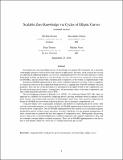Scalable Zero Knowledge Via Cycles of Elliptic Curves
Author(s)
Ben-Sasson, Eli; Chiesa, Alessandro; Tromer, Eran; Virza, Madars
Download453_2016_221_ReferencePDF.pdf (2.510Mb)
PUBLISHER_POLICY
Publisher Policy
Article is made available in accordance with the publisher's policy and may be subject to US copyright law. Please refer to the publisher's site for terms of use.
Terms of use
Metadata
Show full item recordAbstract
Non-interactive zero-knowledge proofs of knowledge for general NP statements are a powerful cryptographic primitive, both in theory and in practical applications. Recently, much research has focused on achieving an additional property, succinctness, requiring the proof to be very short and easy to verify. Such proof systems are known as zero-knowledge succinct non-interactive arguments of knowledge (zk-SNARKs), and are desired when communication is expensive, or the verifier is computationally weak. Existing zk-SNARK implementations have severe scalability limitations, in terms of space complexity as a function of the size of the computation being proved (e.g., running time of the NP statement’s decision program). First, the size of the proving key is quasilinear in the upper bound on the computation size. Second, producing a proof requires “writing down” all intermediate values of the entire computation, and then conducting global operations such as FFTs. The bootstrapping technique of Bitansky et al. (STOC ’13), following Valiant (TCC ’08), offers an approach to scalability, by recursively composing proofs: proving statements about acceptance of the proof system’s own verifier (and correctness of the program’s latest step). Alas, recursive composition of known zk-SNARKs has never been realized in practice, due to enormous computational cost. Using new elliptic-curve cryptographic techniques, and methods for exploiting the proof systems’ field structure and nondeterminism, we achieve the first zk-SNARK implementation that practically achieves recursive proof composition. Our zk-SNARK implementation runs random-access machine programs and produces proofs of their correct execution, on today’s hardware, for any program running time. It takes constant time to generate the keys that support all computation sizes. Subsequently, the proving process only incurs a constant multiplicative overhead compared to the original computation’s time, and an essentially-constant additive overhead in memory. Thus, our zk-SNARK implementation is the first to have a well-defined, albeit low, clock rate of “verified instructions per second”.
Date issued
2016-10Department
Massachusetts Institute of Technology. Computer Science and Artificial Intelligence Laboratory; Massachusetts Institute of Technology. Department of Electrical Engineering and Computer Science; Massachusetts Institute of Technology. Department of Mathematics; Massachusetts Institute of Technology. Media LaboratoryJournal
Algorithmica
Publisher
Springer US
Citation
Ben-Sasson, Eli, Alessandro Chiesa, Eran Tromer, and Madars Virza. “Scalable Zero Knowledge Via Cycles of Elliptic Curves.” Algorithmica 79, no. 4 (October 4, 2016): 1102–1160.
Version: Author's final manuscript
ISSN
0178-4617
1432-0541